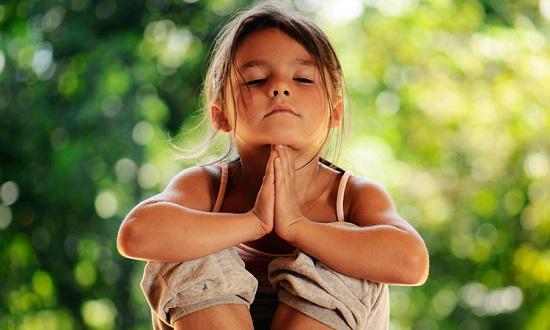685
7 exercises to develop attention and perseverance in the child. Now Blog - only praise!
Distraction and inattention - lack of many adults, what can we say about the children! While in junior high student who is in the clouds and can not concentrate on the material, can justify because of his young age and in high school this number does not pass. Fortunately, mindfulness - a quality that does not come with birth, and easily acquired with the help of special exercises. If you see that your child has recently behaves very vaguely -udeli this issue special attention. And if your baby is still quite a pipsqueak, he must take these lessons for the next game. Combined with other mummies and spend activity for several children. Positive emotions are provided to each participant! Let's get started!

Exercise 1. Bell
Ring the bell and ask the children to listen to the sound vibration of the bell. Tell them to quietly raised their hands when the ringing stops. After this easy lesson done, ask the children to be quiet for a minute and pay attention to other sounds that they hear after the ringing stopped. After this approach to each child and ask him to tell me what sounds he heard. This exercise develops speech, sense of perception and attention.
Exercise 2. Breathing
Give each child a toy (or other small object), and if room allows, ask the children to lie on the floor while they put the toys in the stomach. Tell them to breathe in silence for a minute and pay attention to how breathing raises and lowers the toy, as well as any other feelings that they will feel. Ask them to imagine that all the disturbing thoughts turn into bubbles and fly up high. Meditative breathing makes children friendlier, quieter, allowing them to see what's activity does not have to be noisy.
Exercise 3. Meditation
While the children lie on the floor, ask them to close their eyes and much-much (as possible) to squeeze all the muscles. Tell them to his fingers, toes, strained thigh, neck, shoulders and raised their head. Ask the children to hold in this position for as long as possible, then breathe deeply and relax completely.
Exercise 4. Odor
Give each child some object with natural aroma: a sprig of jasmine or lavender, orange peel, lemon peel, leaf geraniums ... Ask your child to close his eyes and breathe in the aroma, focusing only on their feelings nëm. This exercise works on the brain, improves memory, attention, perseverance, ability to concentrate.
Exercise 5. Touch
Prepare several pieces of different sizes and shapes. It may be buttons, pebbles, feathers, balls, soft toy ... Ask your child to close her eyes, get it out of the box (package) the object and describe it. This is a very useful exercise not only for children but also for adults!
Exercise 6. Heartbeat
Ask the children to jump for one minute, and then tell them to sit back and put his arms around the heart. Let close their eyes and feel your heartbeat, breathing, let him tell you what else they feel in your body.
Exercise 7. Feelings
Exercise can be called "Let's talk about feelings." Have the children sit back and talk to you about their feelings. What do they feel? How do they know that they have certain feelings? Tie Whether they feel certain organs? Also ask what feelings they like most, what they can do to feel better.
If after school you see that your child is upset about something, I remind him that he can always turn your negative thoughts into vials or relax through meditation. If children are in need of rest, allowing them a few minutes to listen to your own breath or feel palpitations.

Many children need support, not only parents, but also psychologists. And if this is our mentality seems to be something unusual and strange, try to cope with children's distraction, nervousness, inattention, irritability. All our complexes are laid in childhood. Let your child grow harmonious personality! Tell a friend about this article, who have children. Surely they learn something useful!
via takprosto cc

Exercise 1. Bell
Ring the bell and ask the children to listen to the sound vibration of the bell. Tell them to quietly raised their hands when the ringing stops. After this easy lesson done, ask the children to be quiet for a minute and pay attention to other sounds that they hear after the ringing stopped. After this approach to each child and ask him to tell me what sounds he heard. This exercise develops speech, sense of perception and attention.
Exercise 2. Breathing
Give each child a toy (or other small object), and if room allows, ask the children to lie on the floor while they put the toys in the stomach. Tell them to breathe in silence for a minute and pay attention to how breathing raises and lowers the toy, as well as any other feelings that they will feel. Ask them to imagine that all the disturbing thoughts turn into bubbles and fly up high. Meditative breathing makes children friendlier, quieter, allowing them to see what's activity does not have to be noisy.
Exercise 3. Meditation
While the children lie on the floor, ask them to close their eyes and much-much (as possible) to squeeze all the muscles. Tell them to his fingers, toes, strained thigh, neck, shoulders and raised their head. Ask the children to hold in this position for as long as possible, then breathe deeply and relax completely.
Exercise 4. Odor
Give each child some object with natural aroma: a sprig of jasmine or lavender, orange peel, lemon peel, leaf geraniums ... Ask your child to close his eyes and breathe in the aroma, focusing only on their feelings nëm. This exercise works on the brain, improves memory, attention, perseverance, ability to concentrate.
Exercise 5. Touch
Prepare several pieces of different sizes and shapes. It may be buttons, pebbles, feathers, balls, soft toy ... Ask your child to close her eyes, get it out of the box (package) the object and describe it. This is a very useful exercise not only for children but also for adults!
Exercise 6. Heartbeat
Ask the children to jump for one minute, and then tell them to sit back and put his arms around the heart. Let close their eyes and feel your heartbeat, breathing, let him tell you what else they feel in your body.
Exercise 7. Feelings
Exercise can be called "Let's talk about feelings." Have the children sit back and talk to you about their feelings. What do they feel? How do they know that they have certain feelings? Tie Whether they feel certain organs? Also ask what feelings they like most, what they can do to feel better.
If after school you see that your child is upset about something, I remind him that he can always turn your negative thoughts into vials or relax through meditation. If children are in need of rest, allowing them a few minutes to listen to your own breath or feel palpitations.

Many children need support, not only parents, but also psychologists. And if this is our mentality seems to be something unusual and strange, try to cope with children's distraction, nervousness, inattention, irritability. All our complexes are laid in childhood. Let your child grow harmonious personality! Tell a friend about this article, who have children. Surely they learn something useful!
via takprosto cc
This is the fastest cherry pie in the world. And on top of an incredibly delicious.
Baked tomatoes with minced meat in Arabic: a dish that will be a favorite on your holiday table!






















